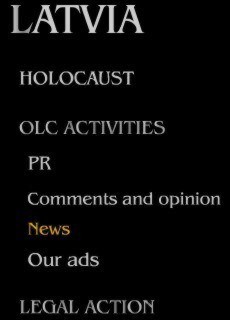|
A squabble between British politicians
has grown into a minor diplomatic issue between Latvia and
the United Kingdom, but the foreign ministers of both countries
say relations remain outstanding.
British Foreign Secretary David Miliband told Latvian Foreign Minister Māris
Riekstiņš in an Oct. 3 telephone conversation that comments
he made during his Labour Party’s annual conference were
not aimed at Latvia or its government.
Miliband, during an Oct. 1 speech
to the Labour Conference, attacked the rival Conservative
Party for its ties to Latvia’s For Fatherland and Freedom
(Tēvzemei un Brīvībai, or TB/LNNK), which he said supports
the annual march in Rīga by World War II veterans who served
in Nazi Germany’s Waffen SS.
“It makes me sick,” Miliband said,
according to a transcript of the speech.
Miliband was referring to a Sept.
22 discussion with Conservative Party Chairman Eric Pickles
and Liberal Democrats spokesman Chris Huhne on the BBC’s
Radio 4.
During the discussion, Huhne blasted
the Conservatives for its alliances with conservative parties
in Europe.
“The Latvian party actually celebrates
Adolf Hitler’s Waffen SS,” Huhne said, referring to TB/LNNK
and its backing of the annual March 16 commemoration by Latvian
Legion veterans. During the war, Germany organized two divisions
of Latvian soldiers to fight against Soviet forces. The majority
of the Latvian soldiers were conscripts.
“I’m a bit surprised you’re using
that old Molotov smear against the Latvians,” Pickles replied
to Huhne, referring to former Soviet Foreign Minister Vyacheslav
Molotov.
A week later, Nazi hunter Efraim Zuroff
of the Simon Wiesenthal Center, in a commentary published
in the London-based daily newspaper The Guardian, took Pickles
to task for his defense of the Latvian party.
“The obsession of ‘For Fatherland
and Freedom’ to pay public homage to the Latvian-SS Legion
in contradiction to all historical logic and sensitivity
to Nazi crimes is not a product of ostensibly harmless nostalgia
as Pickles would have us believe,” Zuroff wrote, “but part
of a rather insidious plan to gain recognition for a perversely
distorted version of European history which will officially
equate Communism with Nazism.”
Zuroff has been campaigning against
an effort by Eastern European political leaders to have Aug.
23 declared a European Day of Remembrance for Victims of
Stalinism and Nazism. It was on Aug. 23, 1939, that the Soviet
Union and Nazi Germany signed the Molotov-Ribbentrop nonagression
pact. A secret protocol in the pact brought the Baltic states
into the Soviet sphere of influence and led to the occupation
of those countries.
TB/LNNK spokesman Rolands Pētersons,
calling Zuroff’s comments baseless and defamatory, said in
a Sept. 29 press release that the party has never defended
Nazi crimes nor glorified the military units of the Hitler
regime, but has only showed respect to Latvian soldiers who
fought during World War II.
Following Miliband’s speech to the
Labour Conference, Roberts Zīle, a member of the European
Parliament and leader of TB/LNNK, countered Zuroff in an
Oct. 2 commentary in The Guardian.
“It is simply absurd,” Zīle wrote,
“to declare that Latvians who wish to honour their compatriots
who fought and died in the Second World War have any sympathy
for the abhorrent ideologies that were responsible for the
death of so many of my people and that plunged my nation
into decades of occupation by Nazi and Soviet oppressors.”
That same day, Andris Teikmanis, a
state secretary in the Latvian Foreign Ministry, met with
Antony Stokes, charge d’affaires in the British Embassy in
Rīga, to express concern about the comments by British politicians.
Meanwhile in London, Latvian Ambassador Eduards Stiprais
met with Foreign Office officials to deliver a similar message.
During their Oct. 3 telephone conversation,
according to a Latvian Foreign Ministry spokesperson, Miliband
and Riekstiņš agreed that relations between the United Kingdom
and Latvia are outstanding and that the two countries must
continue to work together to resolve questions important
to Europe, including economic recovery.
latviansonline.com
|


